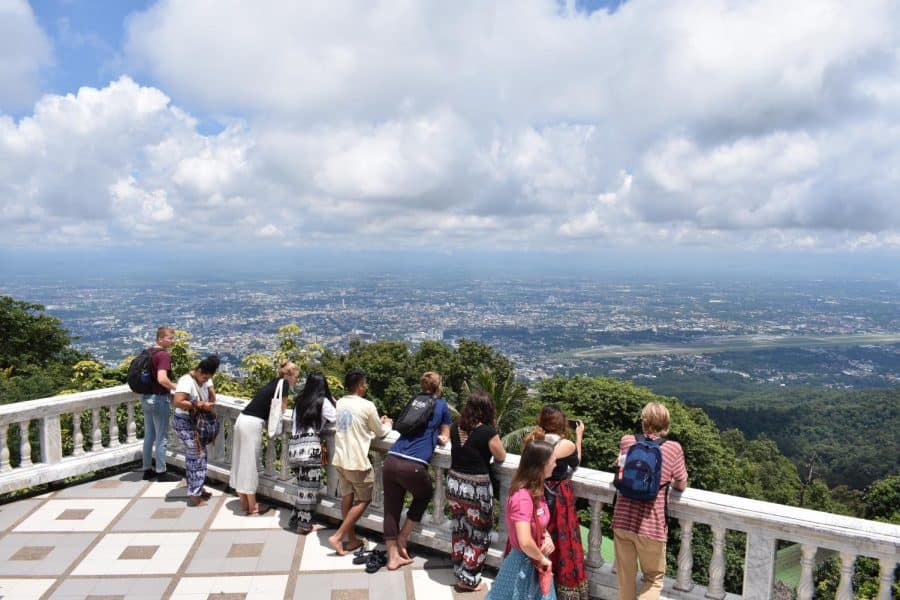Dispatches From Abroad: What expatriates think about Alabama
September 18, 2019
Good ol’ Alabama; I miss it every day after spending about a month away. My football-season FOMO comes on stronger with each poetry-in-motion highlight I watch of Tua & Co., and I dream of barbecue chicken and white sauce. Even some country music in the background would go a long way.
It feels a little too early in my semester to be talking about home, but as I am the only person in my group from the Deep South, it comes up often.
People from around the United States have all kinds of notions about the Heart of Dixie. They involve the state’s recent abortion bill, the beach, evangelicalism, Hannah Brown from The Bachelorette and plenty more.
Through a non-profit called USAC (University Studies Abroad Consortium), 67 of us enrolled to study together in Thailand at Chiang Mai University this fall. Most come from the West Coast, including many from California and others in Oregon and Washington. The Northeast, Southwest and even Norway have a presence here this semester, too.
In the South, we might think of Californians as free-spirited go-getters who like to surf and diffuse essential oils. What do they think of us Southern folk, though?
Isabella Breitbart from Chico, California, initially responded to the question by saying she had nothing against the area and would be “down to visit,” but that she probably preferred the West Coast.
Breitbart spoke specifically of The University of Alabama, saying she had heard about its huge Greek life, tailgating and what she guessed to be a less-than-strict bar scene for the underaged.
As for Alabama’s reputation on social issues, Breitbart said she disagrees heavily with the AL HB-314 bill. This will outlaw all in-state abortion attempts except in cases “to prevent a serious health risk to the unborn child’s mother” in November. Political experts say it is designed to go to the Supreme Court and overturn Roe v. Wade.
Theresa Wilcoski from Chicago, Illinois, said that this bill’s extreme nature reflects poorly on the state.
Wilcoski also said she didn’t understand why so many still support the Confederate sentiment. To her, differences in personal reasons to fly the rebel flag make little difference.
“Even if they aren’t [racist],” Wilcoski said, “it’s still going to be perceived in that way…. To me, that’s more important than any sort of Southern pride.”
I asked Damian Montenegro from the University of Nevada, Reno for his perspective of the South. First, though, he asked specifically for me to spread the word that it’s pronounced “Ne” – “va” (as in “vat”) – “da” (/nɪˈvædə/) after President Trump mispronounced it at a rally in Boulder City.
Montenegro said that he has never been to the Southeast and has little opinion of it, but he mentioned one cause for uncertainty. His classmate from UN Reno, who grew up in Mississippi, caught national attention for a viral photo and interview at the 2017 Charlottesville “Unite the Right” rally.
“It’s a shame,” Montenegro said. “All it takes is one person to get a bad rep of the area.”
Despite their reservations, though, many of my colleagues here have positive impressions of Alabama and the Deep South, too.
Liz St. Pierre, a sustainable agriculture student at the University of Massachusetts Amherst, said she and a friend visited Alabama on a road trip touring the country after they graduated high school. They were “pleasantly surprised” to discover the Gulf Shores and decided to spend two unplanned days camping there.
St. Pierre also enjoyed finding “Southern hospitality” to be alive and real, mentioning outgoing, helpful people who offered help in ways she was not used to.
Overall, the perspectives I have heard from around the country about Alabama have included a mixture of uneasiness, fondness and curiosity.
“What you hear in the news totally makes you create these stereotypes,” St. Pierre said. “I definitely met people who embodied these stereotypes fully, but then I also met people who were very, very different from that.”
Linn Bonito from Oslo, Norway, spent years after high school living, traveling and learning in Australia, Guatemala, India, Cambodia and other places before going to college. Now in Chiang Mai, Thailand, with a group of Americans, she shares insights on American culture as a whole. She noted the country’s diversity and vastness.
“You guys have got everything,” Bonito said. “You’re like a little world inside of your own country.”
Comparing Norwegian and American culture, Bonito said that each tend to strive for individual success. In these cultures, young adults tend to leave their childhood homes at a younger age. On the contrary, in Thailand, it is more accepted to live with family even as you get older and remain more involved with a tight community for longer.
Sometimes, it takes separation from the status quo of a place and way of life to understand it better. I enjoy telling USAC students and Thai people about Alabama. I tell them about the diverse landscape of mountains, beaches, rivers, farmlands and everything in between. I tell them about the way strangers at burger joints ask each other how their customers’ days are going. Some of them say they would even come and visit.
I’m confident that if they do and come see our hidden gems for themselves, they will find themselves on the Roll Tide train by the time they leave. Hopefully, our many out-of-state students would agree.








